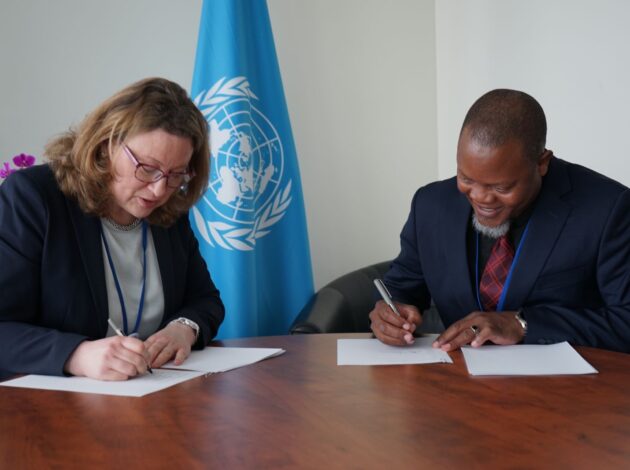Working across four continents to prepare ourselves for another pandemic

If, and when, there is another pandemic, being prepared is the best way to ensure the right response is taken. That is why the ONS is co-creating a Pandemic Preparedness Toolkit, alongside three partner countries. Here, Emma Rourke provides an update on the latest developments including which countries we will be collaborating with on this exciting project.
The Pandemic Preparedness Toolkit (PPT) is a five-year project, funded by Wellcome, which aims to co-create an accessible, sustainable resource that will build capacity for health surveillance in the event of future pandemics.
Putting in place provisions for monitoring the scale and impact of a future pandemic is an important part of developing statistical capability and being able to provide quality statistics to inform evidence-based policies. Globally, none of us want to be unprepared in our response if another pandemic hits. How the National Statistics Office (NSO) in any country is able to use its skills to best effect, and collaborate with public health professionals, is a key part of preparedness.
As I explained in a previous blog, ONS expertise in health statistics, survey design and data governance will be crucial to developing the PPT. This project is also an opportunity to understand and be informed by the experiences and responses in other countries.
Therefore, I am pleased to announce we will be working closely with three Low- and Middle- Income Country (LMIC) Pathfinder Partners – Argentina, Malawi, and Nepal – to build capability in tracking endemic conditions, novel emerging pathogens and escalating infectious diseases. In supporting international management of infectious diseases, we contribute to the protection of our own citizens.
Collaborations are also planned with other NSOs, academics and other non-governmental organisations as part of a wider global network. This will ensure that the toolkit reaches both an extensive audience and its full potential.
Once live, the PPT will be a collection of resources providing practical guidance, statistical methods, knowledge products, case studies, and training materials all to be used across a range of contexts. This project will therefore be the first of its kind to provide a resource specifically designed for NSOs to conduct trusted infectious disease surveillance and work effectively with public health offices to implement evidence-based policies.
What is a Pathfinder Partner?
PPT Pathfinder Partners are the main partnerships for this international project. The three Pathfinder Partners will work in collaboration with the ONS on the co-creation of tools for pandemic surveillance and statistical leadership, drawing on the different strengths across NSOs.
The decision to partner with these countries was taken following a detailed selection process. This involved consideration based on interest, capacity and desire to develop health statistics and infectious disease surveillance, and the generalisability and impact of the toolkit co-created by the combination of countries. Through these partnerships, the PPT project will build capacity across four continents, sharing knowledge, resources and strengths.
Next steps
We recently met delegates from the Argentina, Malawi and Nepal NSOs at the United Nations Statistical Commission, in New York. The PPT project Memorandum of Understanding (MoU) was signed with the Malawi NSO, with virtual MoU signings planned for the Argentina and Nepal NSOs in the coming weeks. Additionally, this meeting provided an opportunity to discuss the importance of the project in the context of each country, as well as the aspirations and potential of the toolkit on a global stage.
The collaboration to design, build and test the toolkit will then start in earnest. As well as adopting the best fit virtual tools to work together across countries, members of the PPT team will be visiting each of the Pathfinder Partner countries in the spring.
These visits will be vital in building working relationships with our NSO partners and learning more from our partners about their experiences with infectious disease surveillance.
International development
The PPT project builds on ONS’s experience supporting statistical capacity building in LMICs. Through collaborative peer-to-peer partnerships we have supported many aspects of statistical modernisation. These successes have included facilitating improvements in NSOs’ data collection, as demonstrated in Kenya ahead of its first digital census in 2019, and building data science capabilities in Rwanda which is now a leader in the region, sharing best practice with its neighbours.
The Pathfinder Partners established for the PPT project build upon previous collaboration with the Malawi and Argentina NSOs. In Malawi, we advised on a review of their recent strategy alongside Statistics Norway, and in Argentina, we are committed to collaborating on evolving statistical issues, particularly the use of big data, administrative data, and machine learning.
The partnership with Nepal is a new relationship for the ONS, which I hope will open the doors to wider collaboration.
I know that no country or statistical system can address all the challenges it faces alone. As we learned during the COVID-19 pandemic, health and infectious disease challenges are increasingly becoming global ones. It is therefore imperative that we work together in partnership, sharing expertise and resources, and leading the way in shaping statistics for the global good. It is my hope that the PPT project will not only strengthen our current partnerships, but also encourage other partnerships between NSOs in health statistics and beyond.

Emma Rourke is deputy national statistician